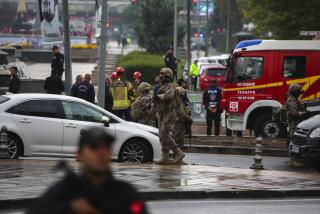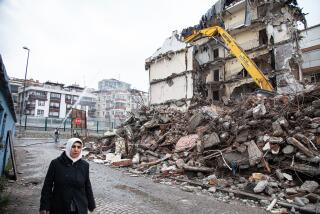Emigres Weather Worst in Istanbul
- Share via
ISTANBUL, Turkey — Mel Kenne was teaching his English literature class at Istanbul’s Kadir Has University on Thursday morning when the world fell apart.
“We heard a loud boom, the room began to shake, I rushed to window and saw a large cloud of yellow smoke rise above the skyline,” Kenne said of the scene at the nearby British Consulate, one of the targets of the latest terrorist attack here. “I’ve never been this scared in my life.”
Kenne, 57, a literature professor and poet from Austin, Texas, is among a growing number of Western academics, writers and artists who have flocked to this ancient city. Like many, he said the recent wave of attacks, Turkey’s worst, won’t force him to leave.
“Sure, I’m really nervous, especially because I’m an American,” Kenne said. “Now that they’ve hit the Jews and the Brits, I reckon we Americans will be next, but I’m not leaving Turkey.”
Last Saturday, twin suicide bomb attacks hit two Istanbul synagogues, and on Thursday, truck bombings struck a London-based bank in addition to the British Consulate.
Kenne said he will steer clear of British and American sites for a while: “Consulates, banks, international hotels, those sorts of places.”
Kenne, who moved to Istanbul 10 years ago, lives in Galata, a cramped, ancient neighborhood lined with decaying turn-of-the century buildings with panoramic views of the city. He said he was drawn by Istanbul’s maze of historical sites, the blend of cultures and natural beauty, and by “the warmth and hospitality of the Turkish people.”
Dominated by a tower built by the city’s Genovese invaders in the 14th century, Galata is home to three synagogues. One of them, Neve Shalom, was among those bombed last Saturday, its facade reduced to a mountain of rubble and shattered glass.
“I was in bed having a cup of tea when I felt the earth shake,” John Ash, a British poet and travel writer who also lives in Galata, recalled of the Neve Shalom bombing. “Six of my windows were shattered in that attack; I can’t believe it’s happening all over again.”
Ash, 55, says he refused to be “cowed into submission by a handful of murderers.... I will not leave my city.”
Many Turks expressed indignation that Al Qaeda, which claimed responsibility for the attacks, had in a statement purported to be acting in the name of Islam and “punishing” Turkey for its alliance with Israel and the United States.
“These people are butchers, not Muslims,” said Hayrullah Kayalar, a local electronics salesman, as he paused to break his daylong fast in keeping with the holy Muslim month of Ramadan.
“They are giving Islam, Muslims and Turkey a bad name, but they will fail,” he said.
Members of the Western business community sounded decidedly less bullish.
“We have to see if this is just a one-off thing, or the beginning of a continuing wave of attacks,” said Atif Cezairli, head of research at the Netherlands-based ING bank in Istanbul. The Istanbul Stock Exchange was closed for trading immediately after Thursday’s blasts and will not reopen before Monday, Turkish officials said.
Still, the Turkish lira stood steady against major Western currencies Friday after the Central Bank intervened in a bid to calm market jitters. At an international five-star hotel, staff members said occupancy had plummeted from 350 guests to 60 the day after Thursday’s attacks.
“This is a nightmare for the tourism industry,” a hotel employee said on condition of anonymity.
Ash, the travel writer, blames President Bush and British Prime Minister Tony Blair.
“If they hadn’t invaded Iraq, none of this would have happened. I am very angry,” he said. “Bush and Blair owe Turkey an apology.”
More to Read
Sign up for Essential California
The most important California stories and recommendations in your inbox every morning.
You may occasionally receive promotional content from the Los Angeles Times.













